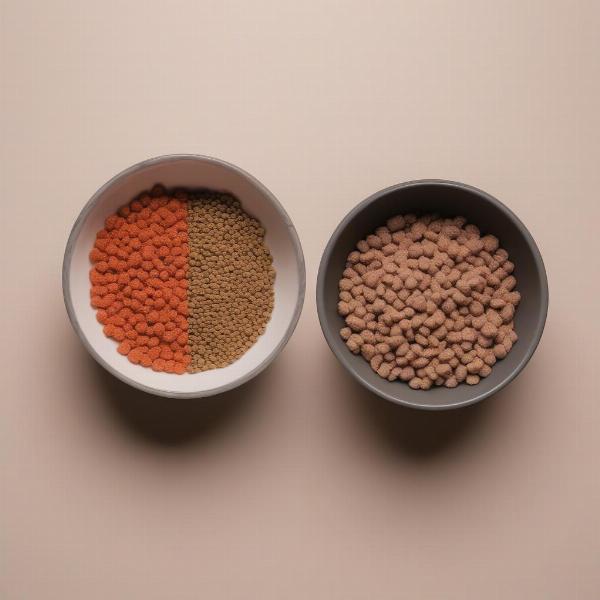Choosing the right food for your German Shepherd puppy is crucial for their growth, development, and overall well-being. A healthy diet sets the foundation for a long, active life, and with so many options available, finding the best dog food for your German Shepherd puppy can feel overwhelming. This article provides practical, expert advice to help you make the best choice for your furry friend.
Understanding Your German Shepherd Puppy’s Nutritional Needs
German Shepherd puppies have specific nutritional requirements to support their rapid growth and active lifestyle. Their diet should be rich in high-quality protein for muscle development, healthy fats for energy and brain function, and essential vitamins and minerals for overall health. Calcium and phosphorus are particularly important for strong bones and teeth, but the ratio of these minerals must be balanced to prevent skeletal problems, a common concern in large breed puppies like German Shepherds. Avoid overfeeding, as this can contribute to rapid growth and increase the risk of joint issues later in life.
Choosing the Right Type of Dog Food
You’ll find a variety of dog food types available, including dry kibble, wet food, and raw diets. Kibble is often the most convenient and cost-effective option, while wet food can be more appealing to picky eaters. Raw diets are gaining popularity, but it’s crucial to research thoroughly and consult with your veterinarian to ensure nutritional balance and safety if you choose this path. Regardless of the type, look for food specifically formulated for large breed puppies.
 Different types of dog food: kibble, wet food, and raw ingredients
Different types of dog food: kibble, wet food, and raw ingredients
Key Ingredients to Look For
When reading dog food labels, focus on the first few ingredients, as they make up the majority of the product. Look for high-quality animal protein sources like chicken, lamb, beef, or fish. Avoid fillers like corn, wheat, and soy, which offer little nutritional value. Healthy fats like fish oil (rich in omega-3 fatty acids) are essential for brain development and a healthy coat. Also, ensure the food contains added vitamins and minerals to meet your puppy’s specific needs.
How Much and How Often to Feed
The amount of food you feed your German Shepherd puppy will depend on their age, weight, and activity level. Follow the feeding guidelines on the dog food package as a starting point, but adjust the portion size as needed to maintain a healthy weight. Overfeeding can lead to obesity, while underfeeding can hinder growth. Divide your puppy’s daily food allowance into several smaller meals throughout the day to prevent digestive upset and maintain stable blood sugar levels.
Transitioning to New Food
When switching your puppy to a new food, do it gradually over several days. Start by mixing a small amount of the new food with their current food, gradually increasing the proportion of new food while decreasing the old food. This gradual transition helps prevent digestive upset. Monitor your puppy’s stool consistency during the transition and consult your veterinarian if you notice any problems.
Conclusion
Choosing good dog food for your German Shepherd puppy is a significant decision that impacts their long-term health and well-being. Prioritize high-quality ingredients, balanced nutrition, and appropriate feeding practices. Remember to consult with your veterinarian for personalized advice tailored to your puppy’s individual needs. Finding the right food might take some experimentation, but with careful research and observation, you can ensure your German Shepherd puppy thrives.
FAQ
- What is the best dog food brand for German Shepherd puppies? There’s no single “best” brand, but choose one that meets the nutritional requirements outlined above and suits your puppy’s individual needs and preferences.
- Can I feed my German Shepherd puppy adult dog food? No, puppies require different nutrient ratios than adult dogs. Feeding adult food can lead to deficiencies and health problems.
- How do I know if my German Shepherd puppy is getting enough to eat? Monitor their weight, energy levels, and stool consistency. Consult with your veterinarian if you have any concerns.
- What are the signs of food allergies in German Shepherd puppies? Common signs include itching, skin rashes, vomiting, and diarrhea. Consult your veterinarian if you suspect a food allergy.
- Can I supplement my German Shepherd puppy’s diet with home-cooked meals? Discuss any dietary supplements with your veterinarian first to ensure they are safe and won’t create nutritional imbalances.
- How often should I change my German Shepherd puppy’s food? Once you find a good food that suits your puppy, you don’t need to change it frequently unless their needs change or they develop an intolerance.
- What should I do if my German Shepherd puppy refuses to eat their new food? Try mixing it with a small amount of their previous food or adding a bit of warm water to soften kibble. If they continue to refuse, consult your veterinarian.
About ILM Dog
ILM Dog is your trusted resource for expert advice on all aspects of dog care and breeding, from puppyhood to senior care. We cover breed selection, health, training, nutrition, grooming, and much more. We are committed to providing practical, evidence-based information to help you navigate the joys and challenges of dog ownership. For personalized advice on your German Shepherd puppy’s nutrition or any other dog-related questions, reach out to our expert team. Contact us at [email protected] or call +44 20-3965-8624.